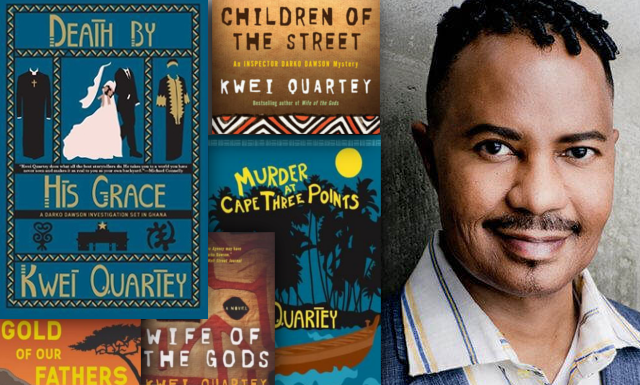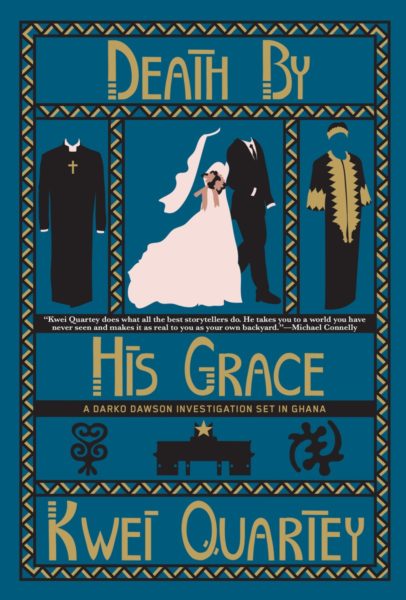
Kwei Quartey’s Death by His Grace, described in Booklist’s starred review as a book that combines “top-notch writing and a full sensory setting ..” comes out in stores in August in paperback.
Quartey was born in Ghana and raised by a black American mother and a Ghanaian father, both of whom were university lecturers. As a teenager, he got into serious trouble with the military government for putting up protest posters; after a stint in prison for “sedition,” he left for the United States, where he has lived ever since. In 2008 he returned to Ghana for the first time, and now visits frequently as research for his writing. A recently-retired physician, he now lives and works in Pasadena. He is the author of two other critically acclaimed novels in the Darko Dawson series, Wife of the Gods and Children of the Street.
Quartey was kind enough to share his author’s perspective in advance of the paperback’s release.
Enjoy!
What’s your new book about?
Religion and piety are a large part of life in Ghana, a country that has been rated one of the most religious in the world. Against this backdrop, Chief Inspector Darko Dawson investigates the appalling murder of Katherine Yeboah, a young woman with a promising future who finds herself cruelly stigmatized because she is infertile. Peeling back the layers one by one, Dawson demonstrates how religion in Ghana fails to overcome profound traditional beliefs tied to lust, greed, and jealousy.
What attracted you to the idea/concept of the book?
I visited Ghana, my birthplace, after a long absence in the US. I found a level of religious fervor—the evangelist, “charismatic” type—that I hadn’t observed as a child growing up there. Anything that strikes me as phenomenal or full of irony and conflict is fodder for a murder mystery. The fundamental question was, can outward piety and reverence for God ever prevent murder?
What kind of research was required?
The story was based in part on the experiences of a good friend of mine in Ghana. She related the awful experiences she went through as an infertile wife victimized by her in-laws, much of which I included in the novel. Additionally, I immersed myself in the massive church events that take place in Ghana, for example, “deliverance vigils,” which include the casting out of demons and the “curing” of disabilities through prayer and the laying of hands.
Which books or authors influenced you while writing this book?
I avoid reading while working on my own novels because I can sometimes unconsciously take on the style of the author whose work I’m reading. I need to write true to myself. That said, Henning Mankell is probably my top favorite crime novelist.
Did anything not make it into the book that readers might find surprising or interesting?
I wrote the story quite lean and I don’t recall there was much fat to trim. There were probably some scenes which I eliminated or downsized, but nothing too significant. The first draft can sometimes be overwritten or overdramatic in spots, so those always need toning down. I consider that par for the course.
When readers finish the book, what do you hope they will think and feel?
The ending is a cliffhanger shocker. I personally like cliffhangers, but some readers may take issue with it. The take-home message for them is that first, life deals blows sometimes and things don’t always wrap up neatly; and second, as bad as it may appear, the ending is not always the end. Stay tuned.
***
“This is a delightful novel, rich in Ghanian culture, with a hero we really come to admire.”
–Reviewing the Evidence

Amazon | Barnes & Noble | IndieBound
* Want the paperback early? Shop Soho Press